We've already compared the Pixel and iPhone 7 base models, but the match-up between the Pixel XL and the iPhone 7 Plus is a little more interesting. While the Pixel and Pixel XL have most of the same specs, Apple pulled out a few more stops in its 7 Plus flagship.
Size
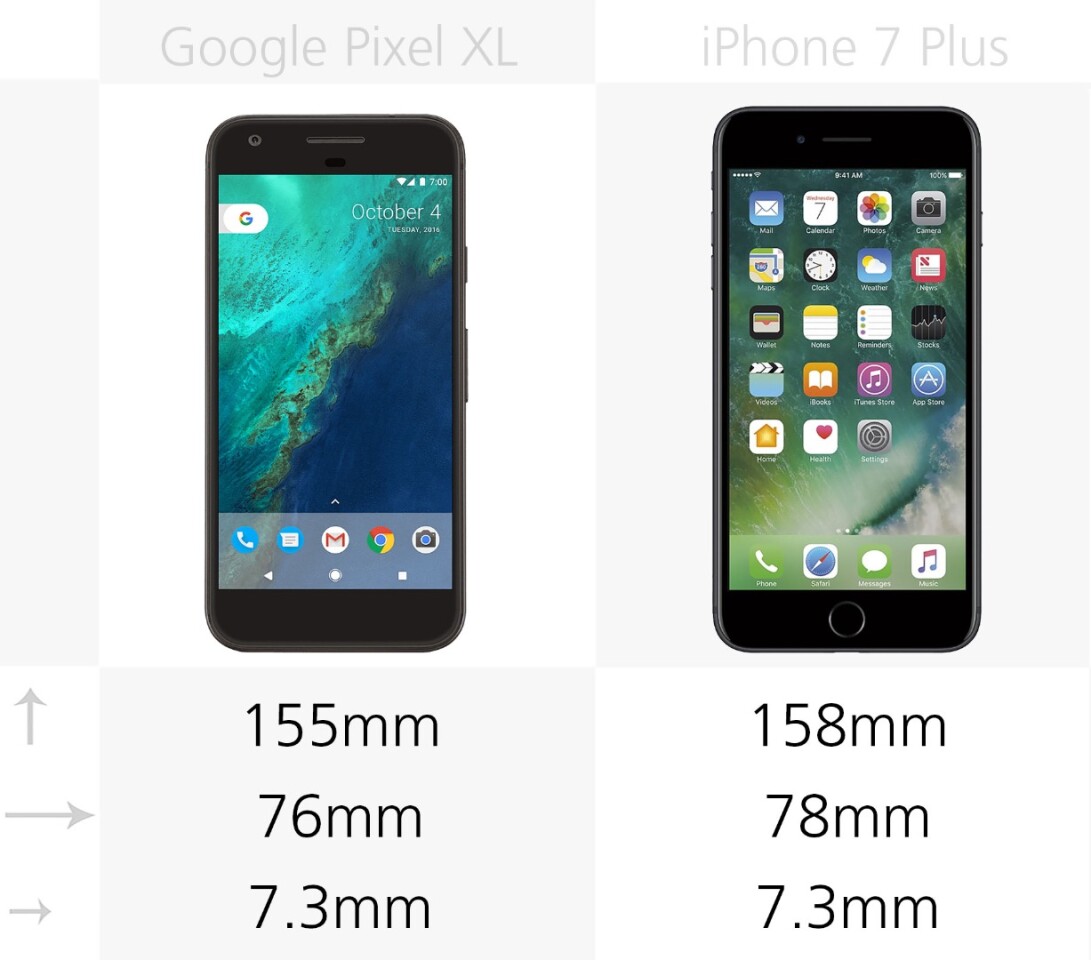
The Pixel isn't so XL next to the iPhone 7 Plus. The iPhone is a few millimeters taller and wider than its Google-made counterpart.
Weight
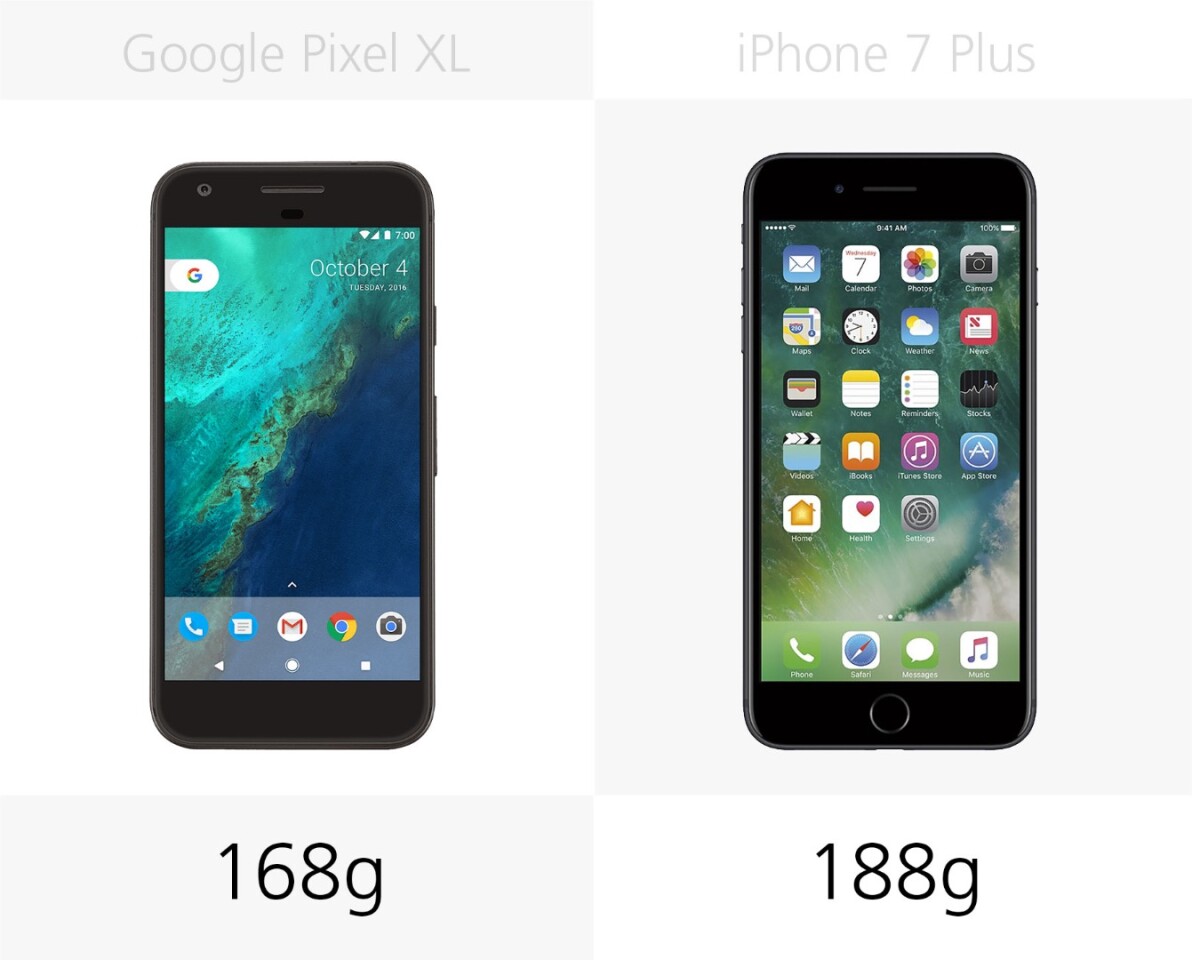
The iPhone is not just bigger, it's also more dense, weighing in at 11-percent more than the Pixel. That's not enough to break your back, but it is quite a bit of difference as far as two similarly sized smartphones go.
Build
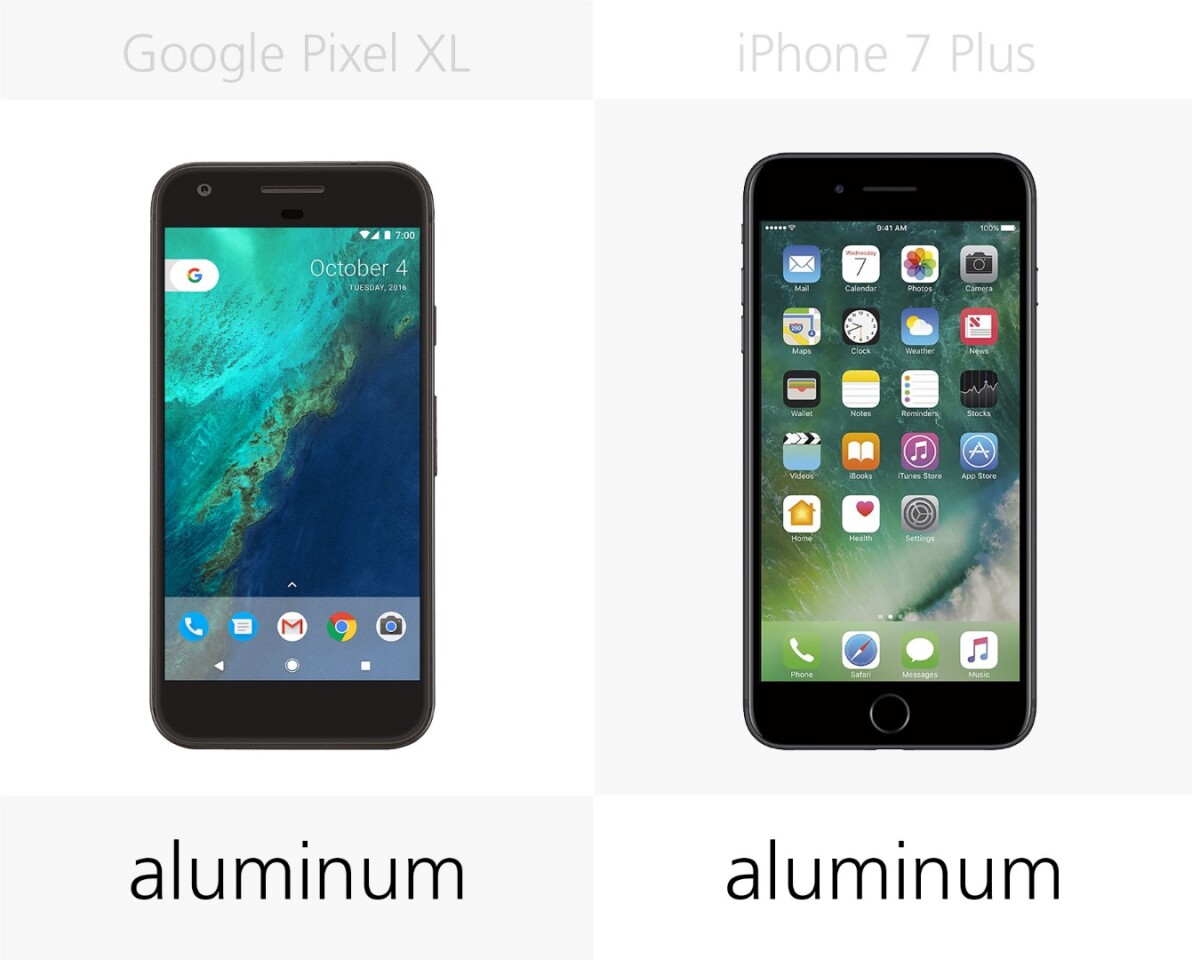
These phones don't push any boundaries when it comes to construction. While we're not exactly excited about seeing another take on a streamlined aluminum unibody, we're not complaining about it, either.
Colors
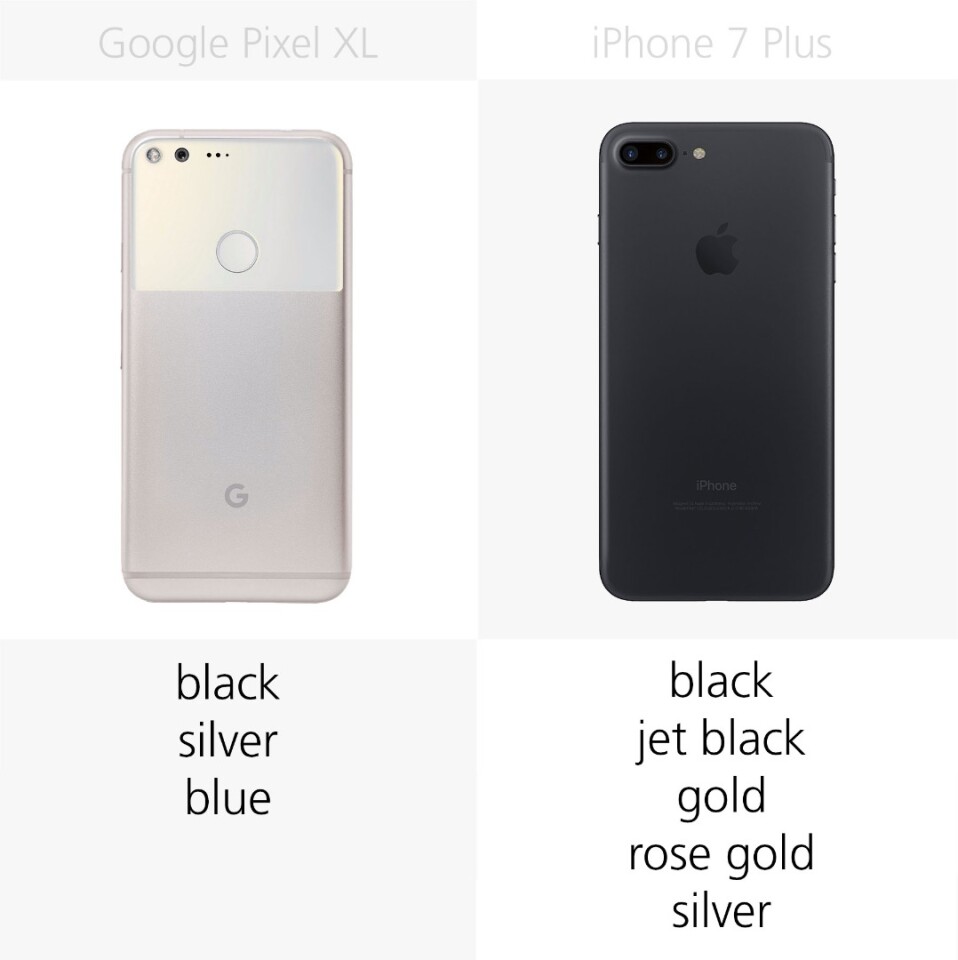
The iPhone has more color variants than Google's flagships, though the Pixel's blue version stands out from the neutral-and-metallic crowd.
Water resistance
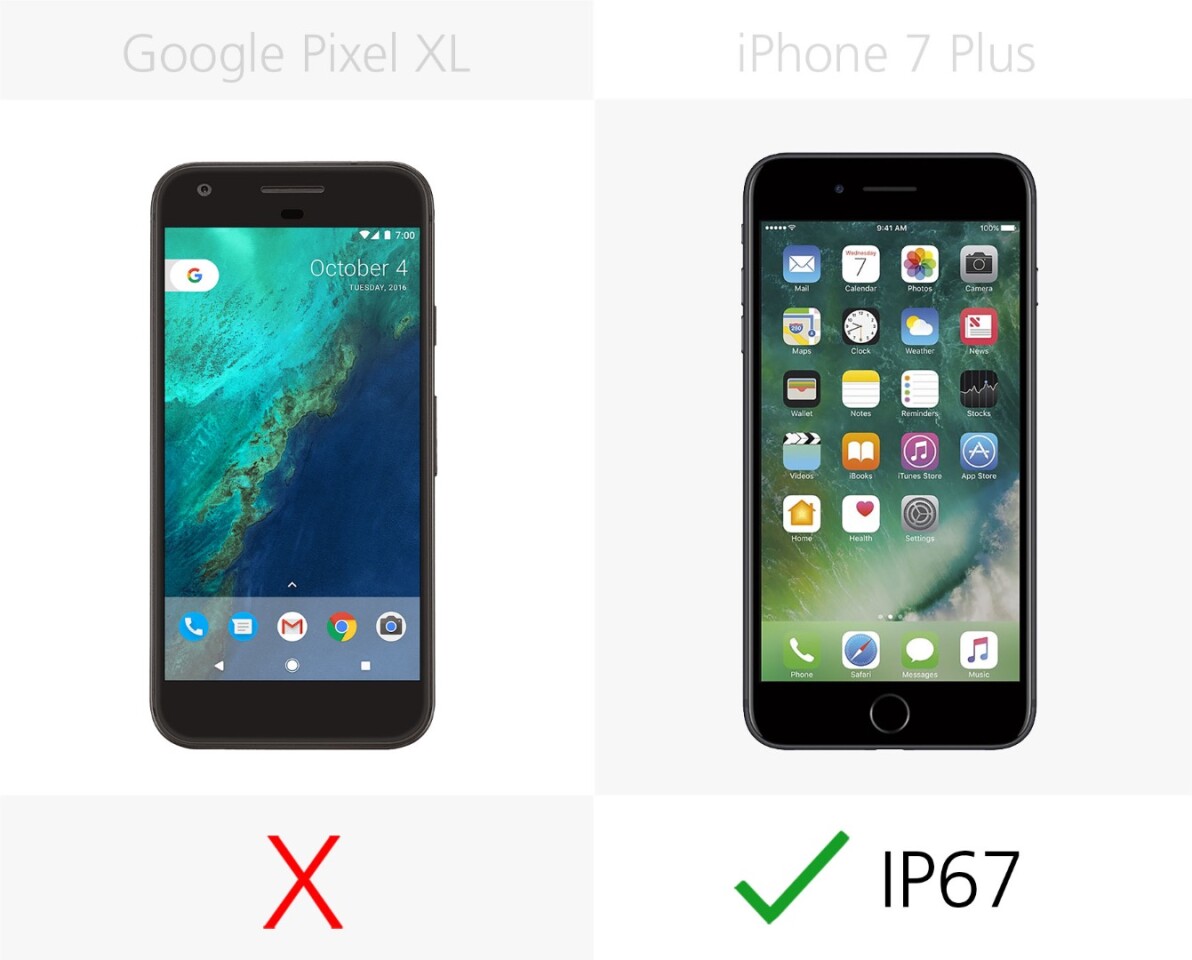
You don't have to kiss your iPhone goodbye if it accidentally goes for a swim. The IP67 rating means it can withstand immersion in up to one meter of water for as long as 30 minutes. On the other hand, Google is a little behind the curve when it comes to water resistance.
Display size
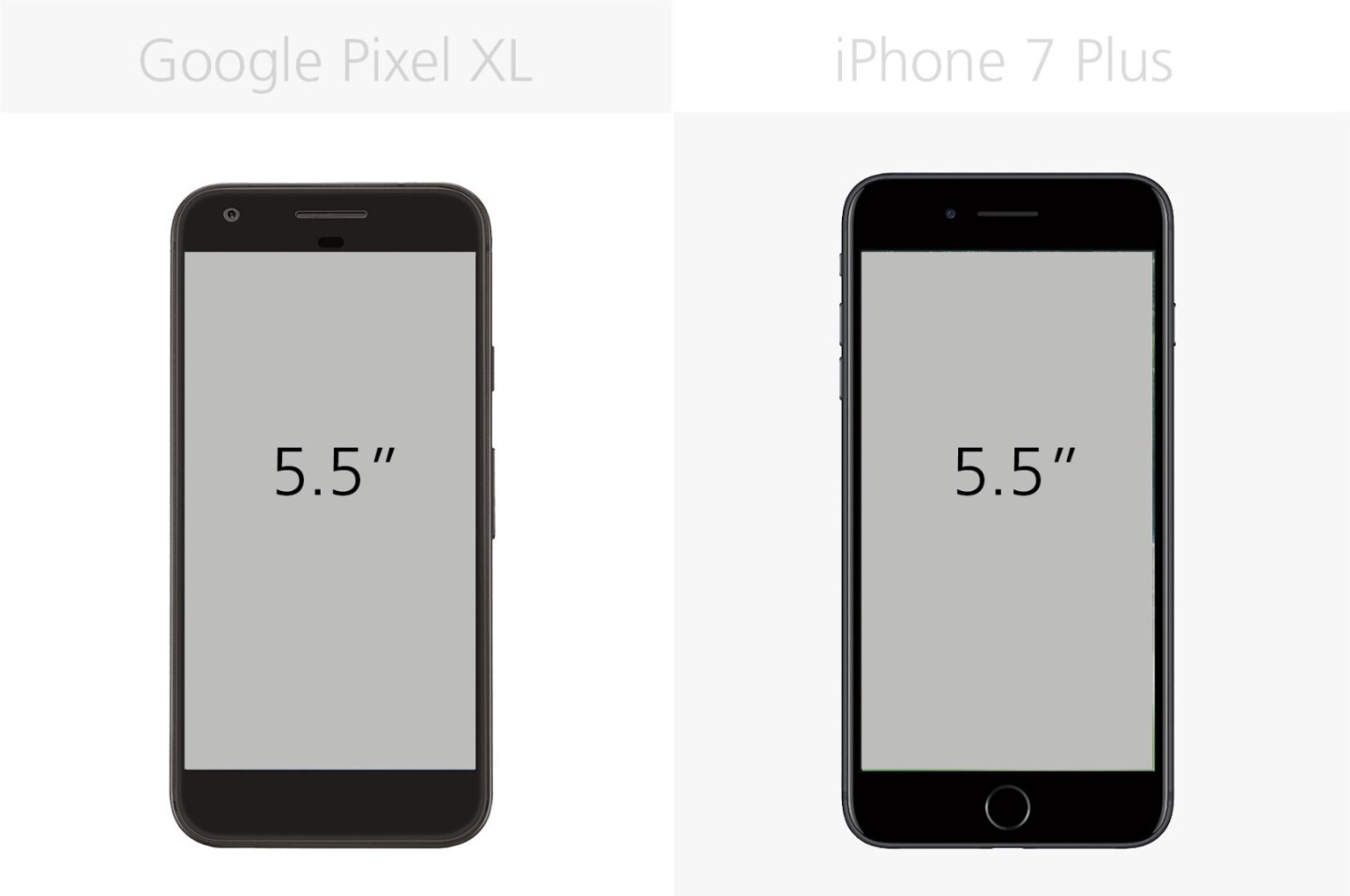
The Pixel XL and iPhone 7 Plus both have 5.5-inch phablet-sized displays.
Display resolution
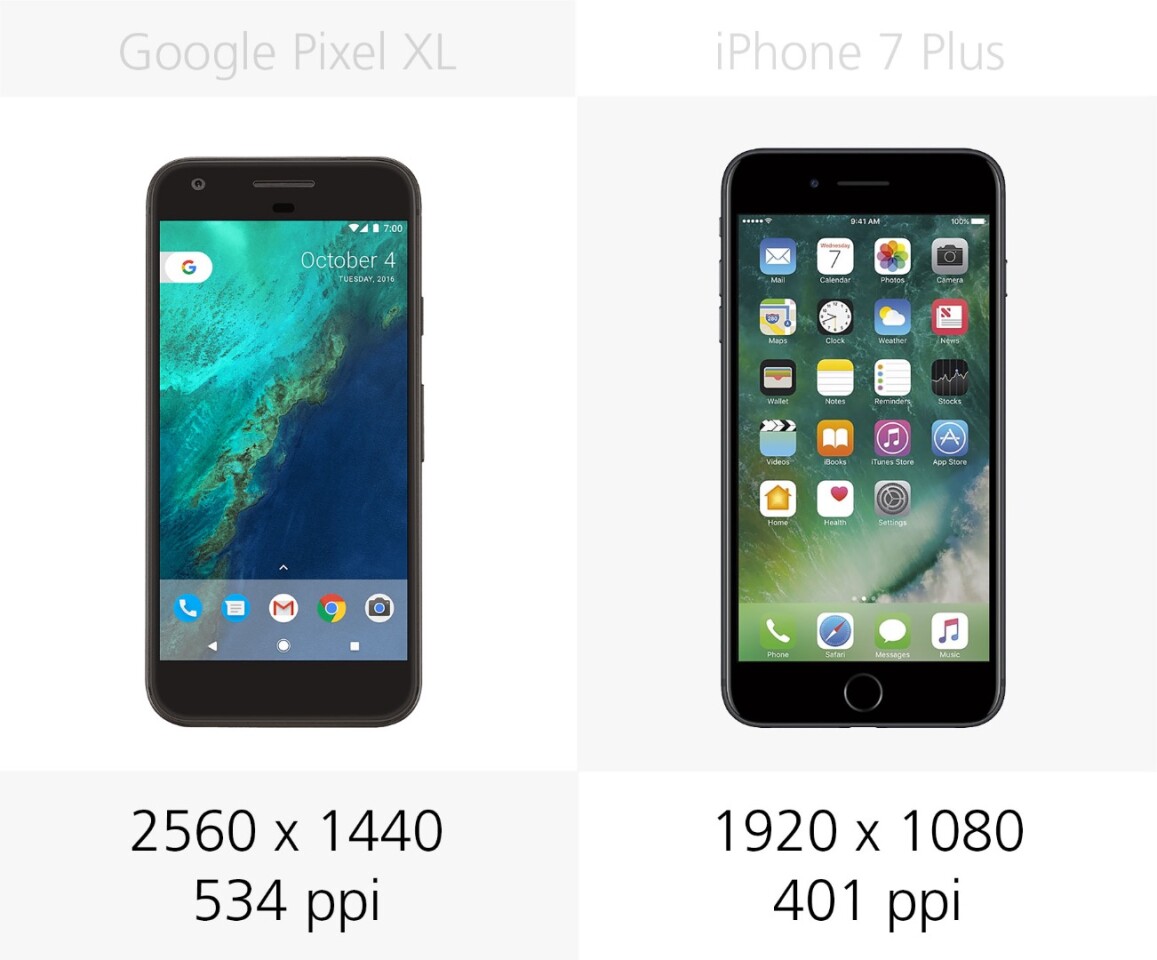
Yes, the Pixel XL display has more pixels. Its pixel density is 28-percent greater than the iPhone 7 Plus display, which will come in handy for powering a virtual reality headset (read on). Still, there are other qualities – white balance, contrast, color saturation – that make the iPhone's display quite lovely.
Display type
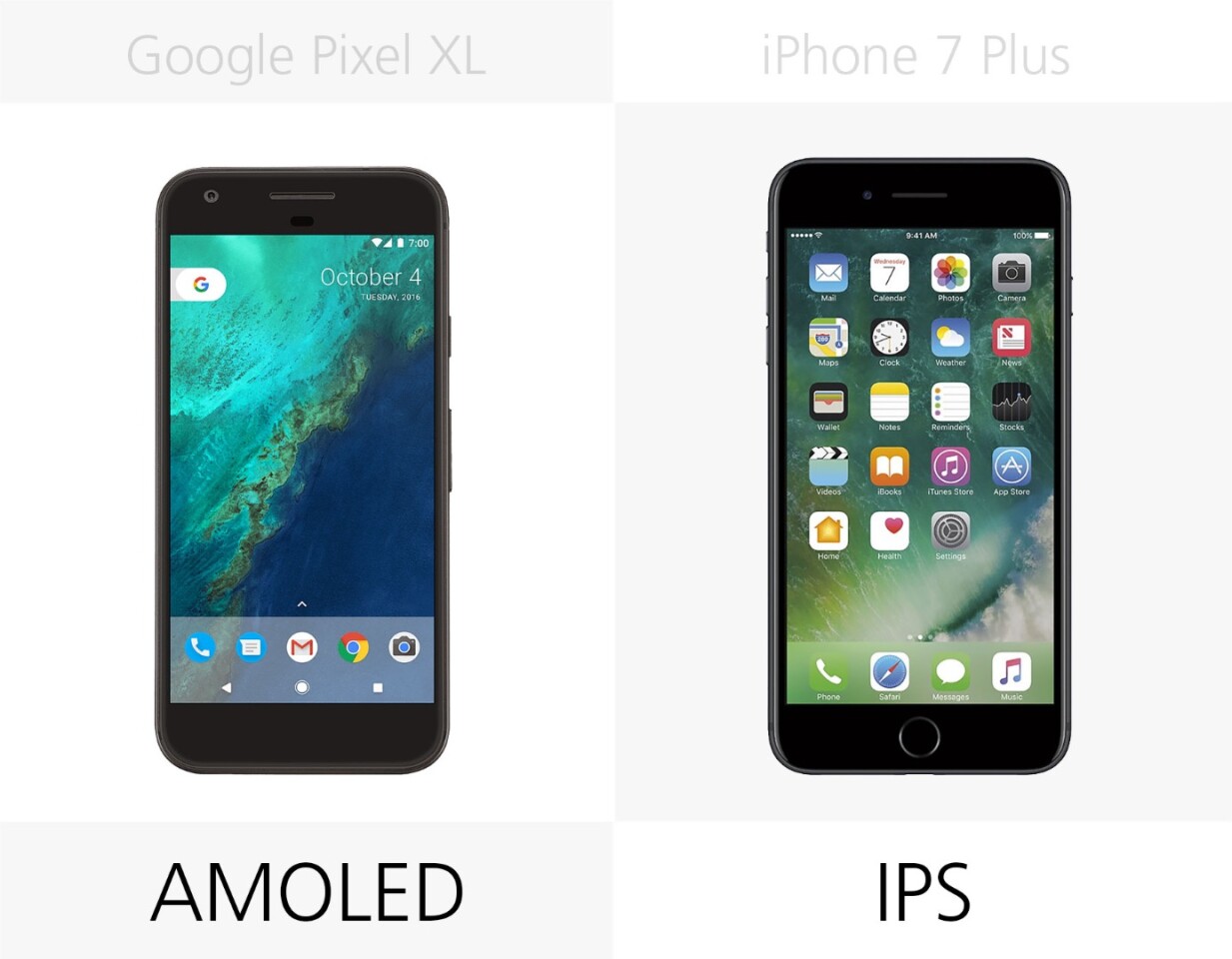
Apple is one of the few smartphone manufacturers clinging to IPS technology. Google follows the herd and opts for AMOLED, with its truer blacks and saturated colors.
Pressure-sensitive display
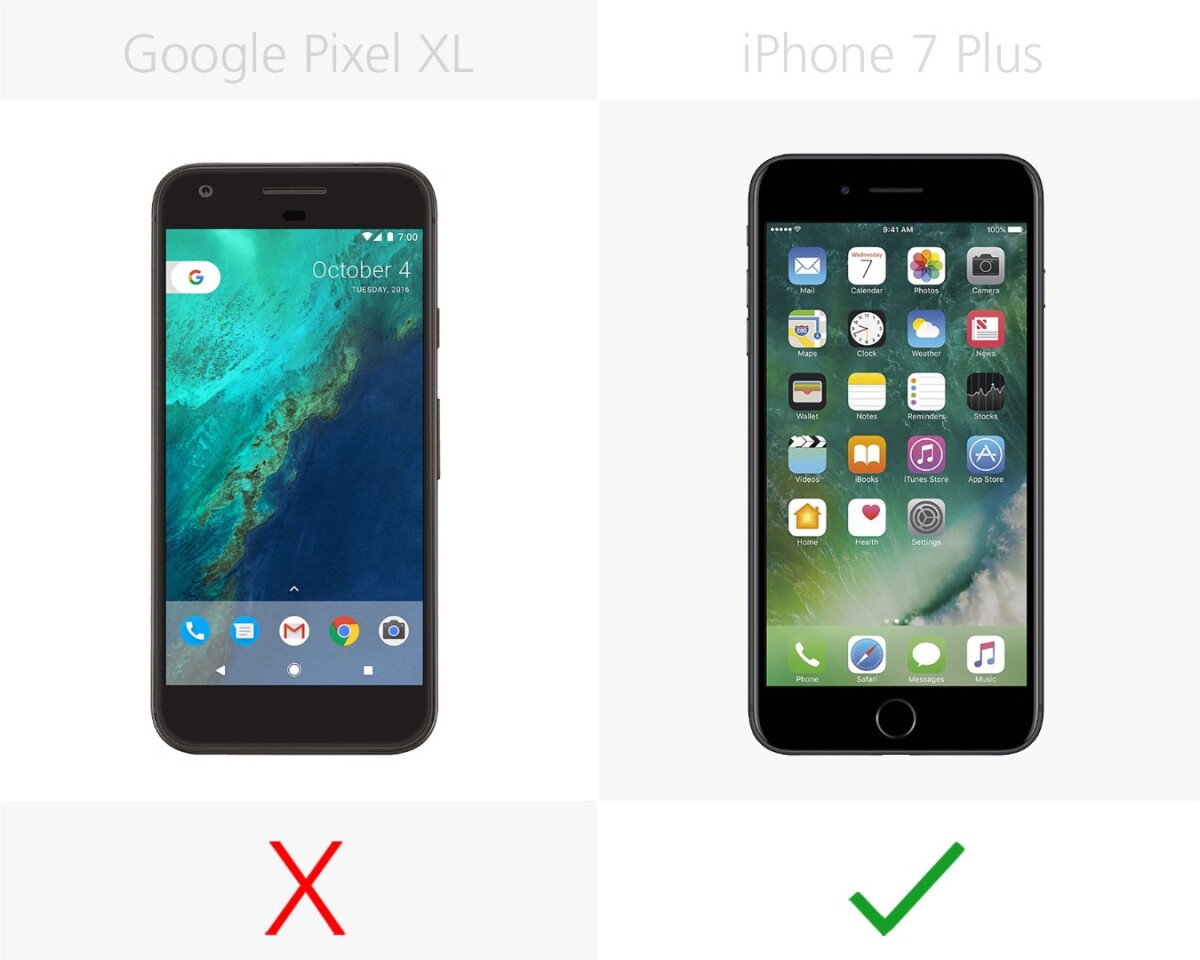
All current iPhones (with the exception of the SE, which is a bit of a throwback) have pressure-sensitive displays, which gives you more ways to interact with the touchscreen beyond simple tapping. Apple dubs this technology "3D Touch".
Camera megapixels
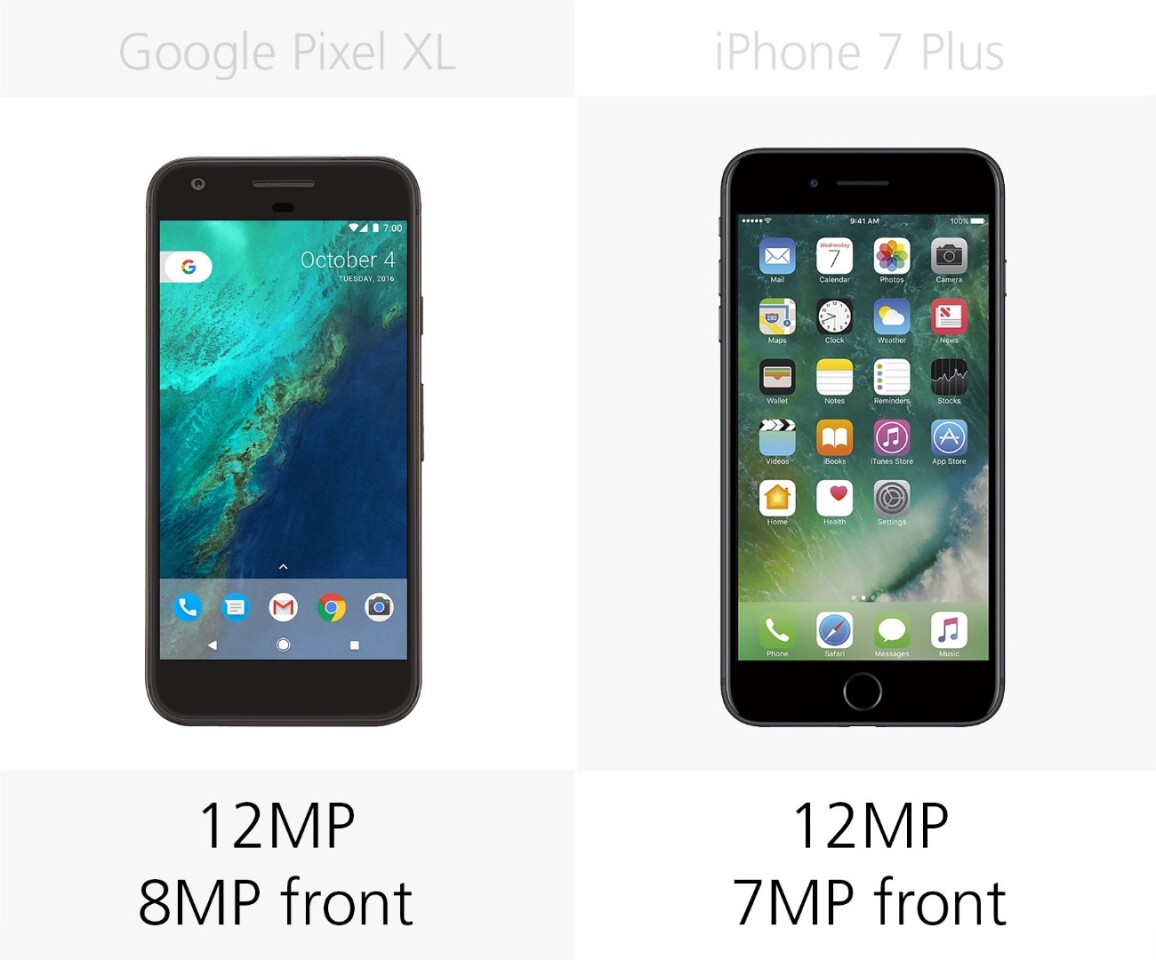
The two phones have equal resolution in the rear-facing cameras, but the Pixel packs a bigger punch in the front camera. Read: sharper selfies.
Dual lens camera

The iPhone 7 Plus has a killer camera feature that the Pixel XL does not: a dual-lens rear camera that enables 2x optical zoom and increased digital zoom. Check out our iPhone 7 Plus review for some photo examples.
Camera aperture (rear)
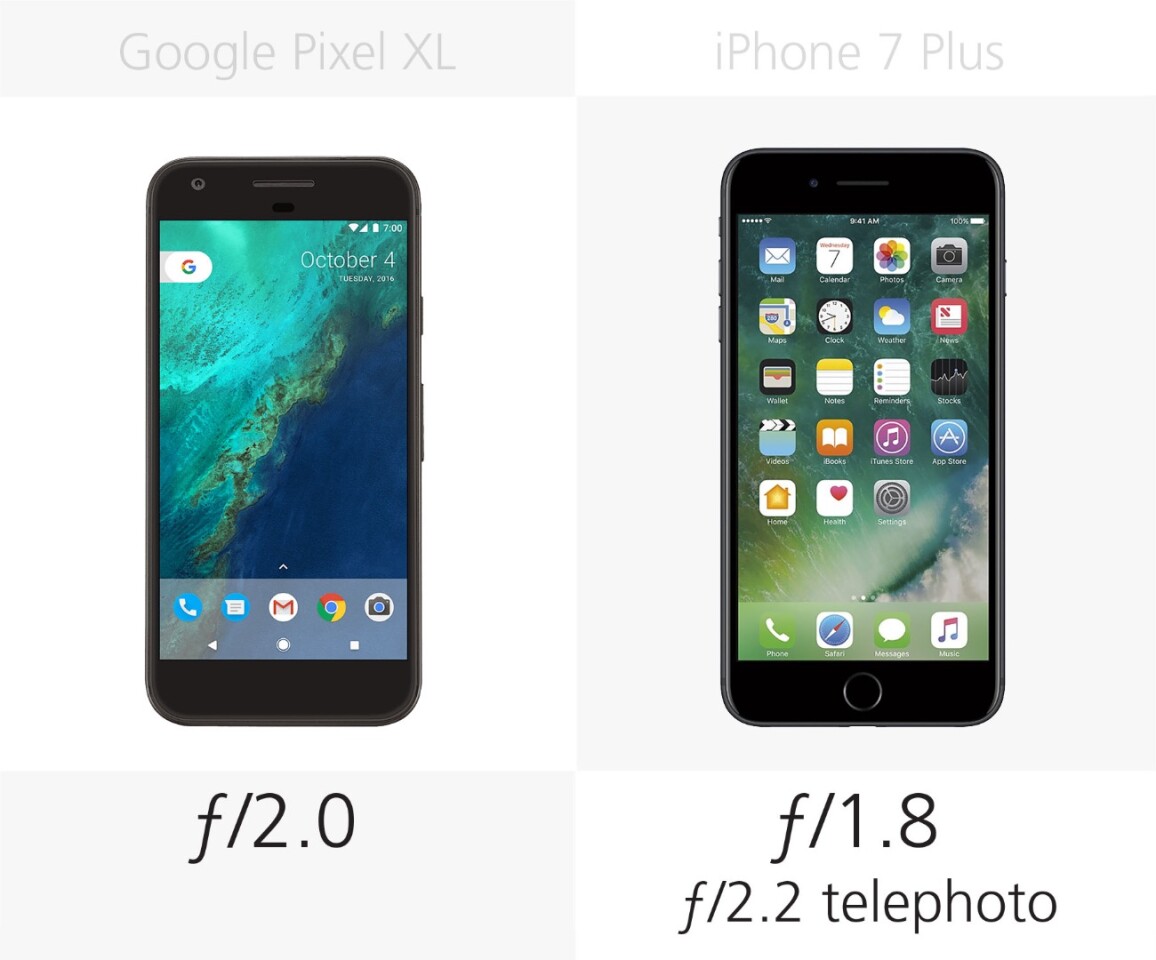
This year, we saw several smartphone manufacturers grow increasingly competitive in the race for larger camera apertures. Among other things, larger apertures let in more light, helping you get better captures when environmental light is low. The lower the f-stop, the bigger the aperture, so the iPhone 7 Plus has an advantage here.
Optical image stabilization

Optical image stabilization, or OIS, is a kind of camera engineering that counteracts the shakiness of your hands while you're taking pictures. It's absent from the Pixel, but it's a nice addition to the iPhone's low-light shooting arsenal.
Battery
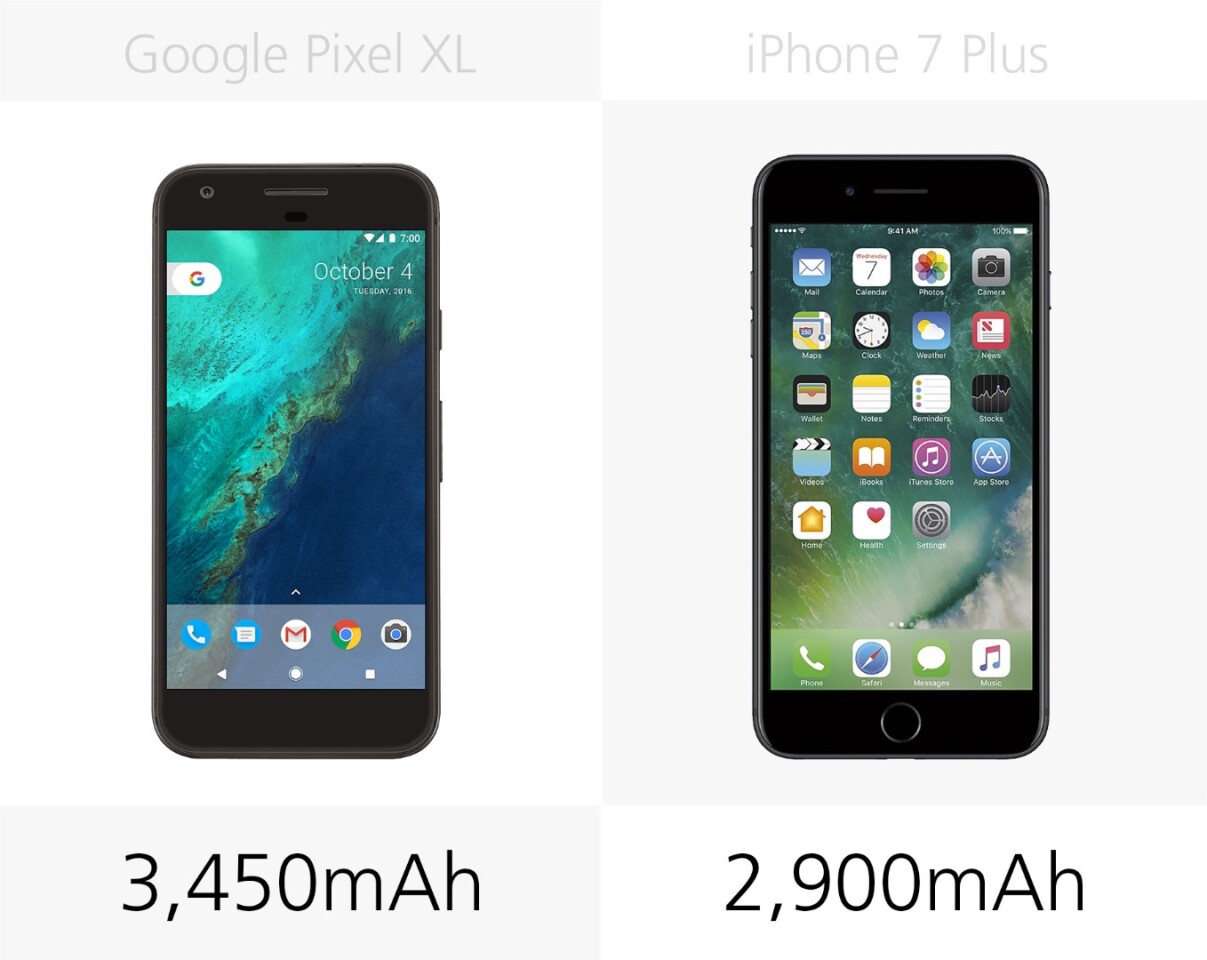
The Pixel XL's jumbo battery trounces the iPhone's in size. There are many other factors in determining battery life, but the Pixel XL does seem to have more staying power overall. According to Google, the Pixel XL offers up to 32 hours of talk time or 14 hours of internet use/video playback. By Apple's count, the 7 Plus can dole out up to 21 hours of talk time, 13 hours of internet use, or 14 hours of video playback.
Fast charging
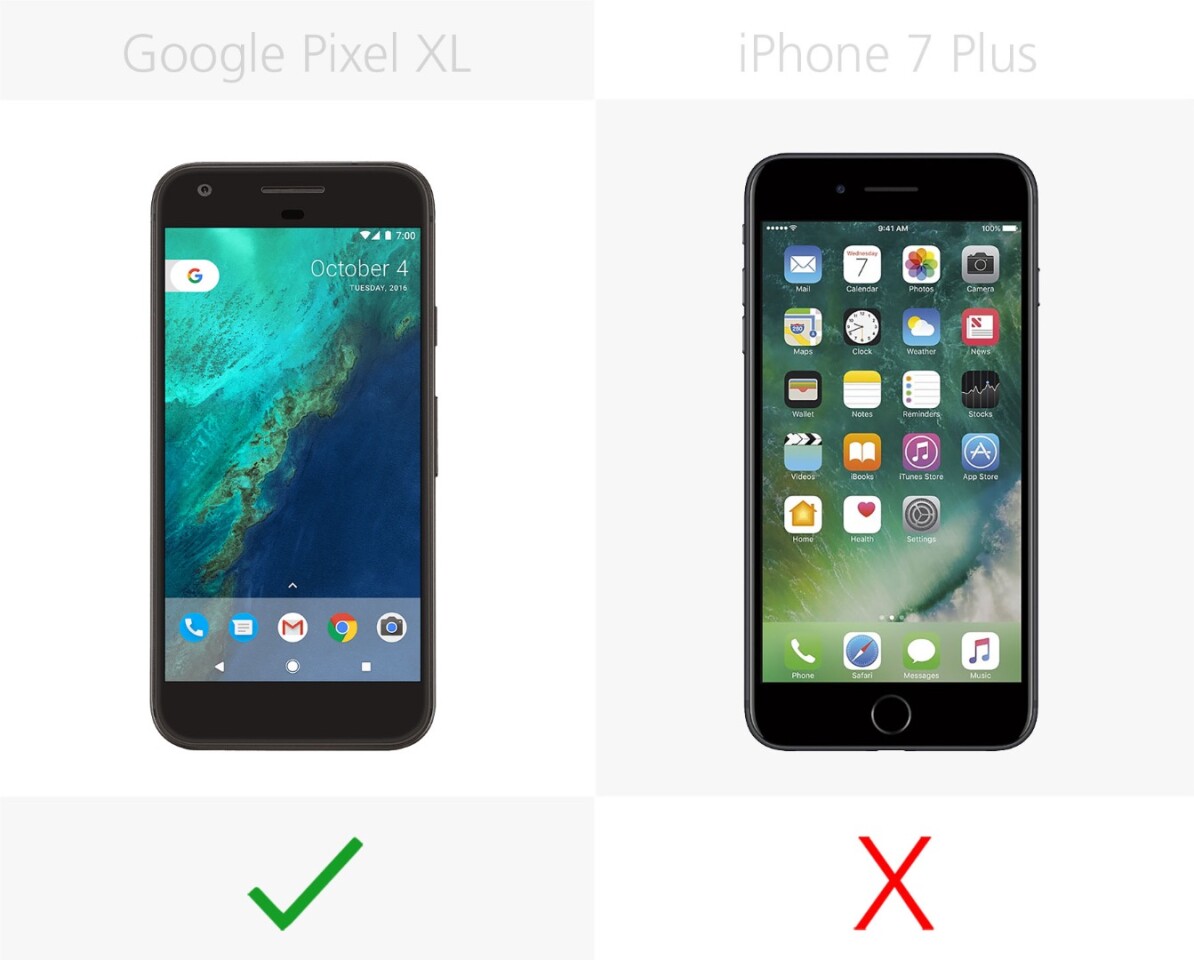
The Pixel can get up to 7 hours of use from a 15-minute charge. iPhone charging is not so expedient.
Wireless charging
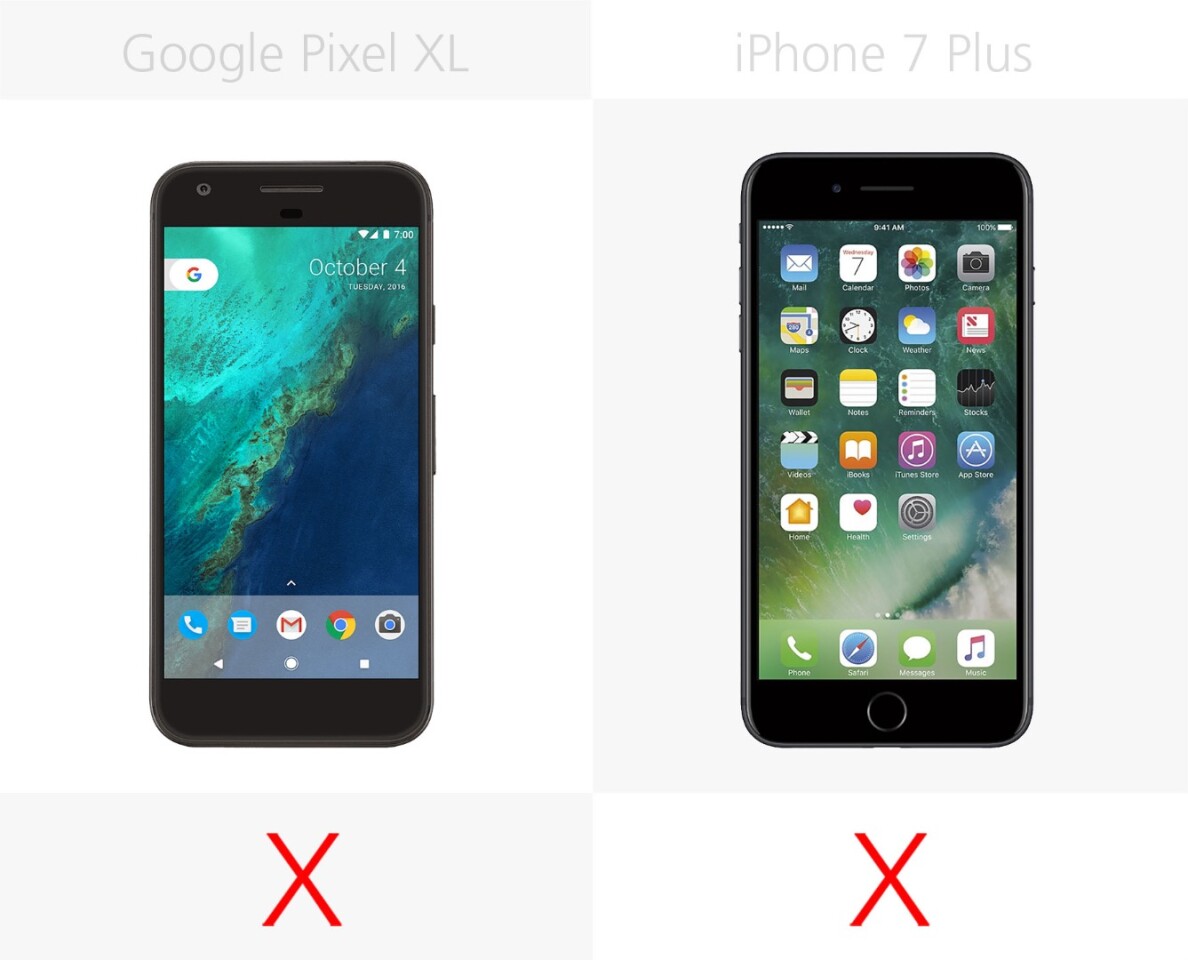
Neither flagship can be charged without a cable: USB-C for the Pixel and a Lightning cord for the iPhone.
Processor
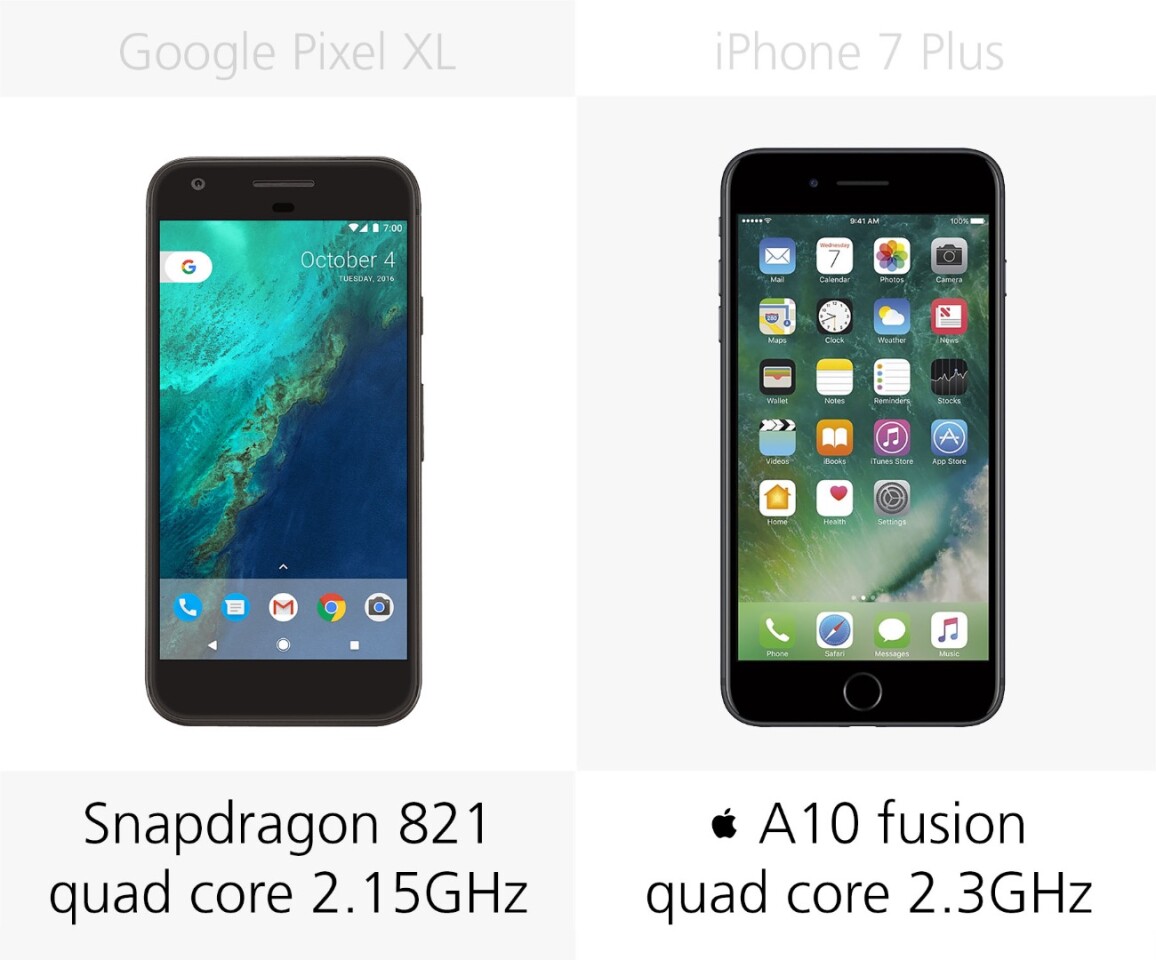
Both phones have ample processing power, but the iPhone 7 Plus clocks in faster.
RAM
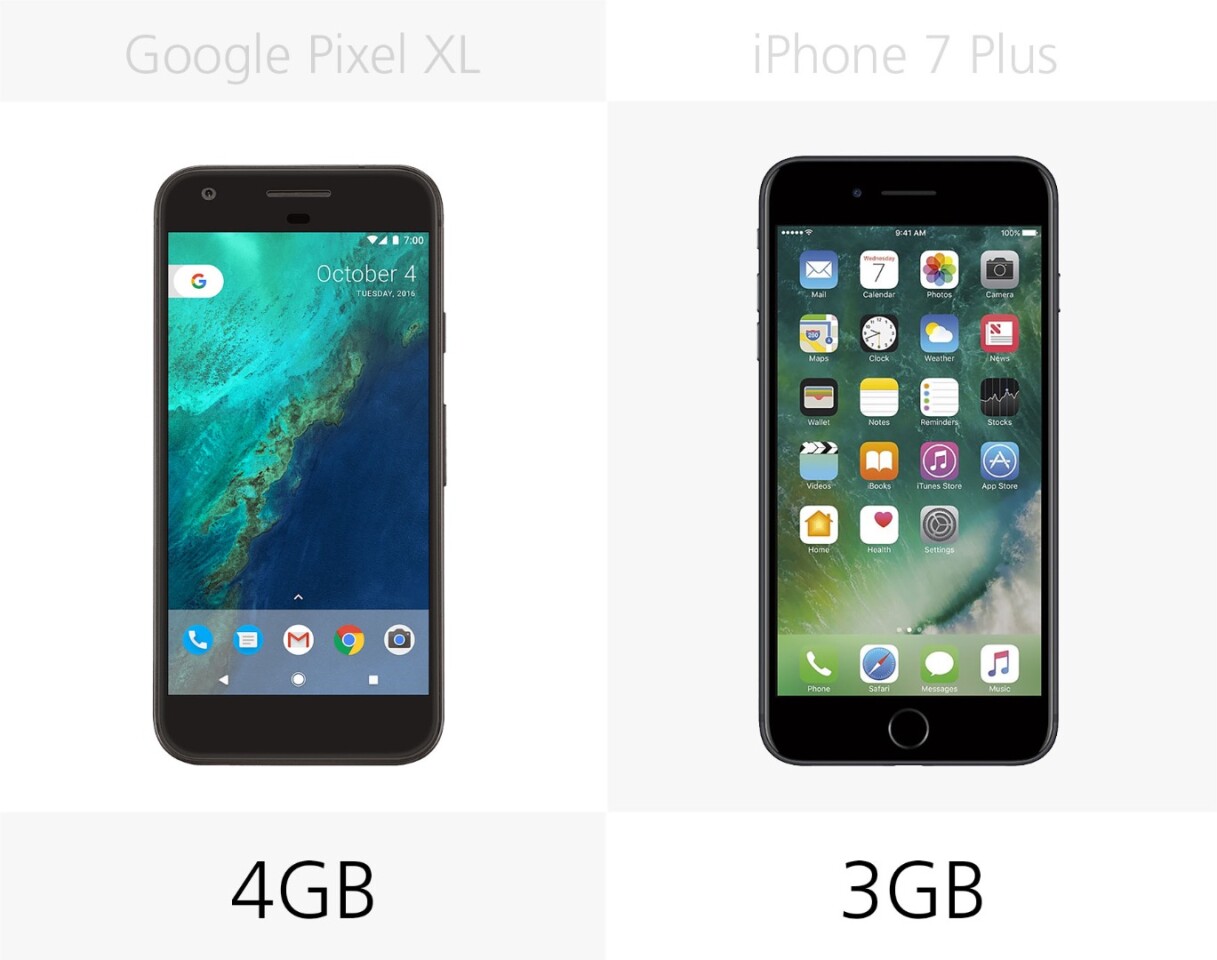
Apple finally upped the RAM in its fleet of flagships, but the iPhone 7 Plus still has less memory than the Pixel XL.
Storage
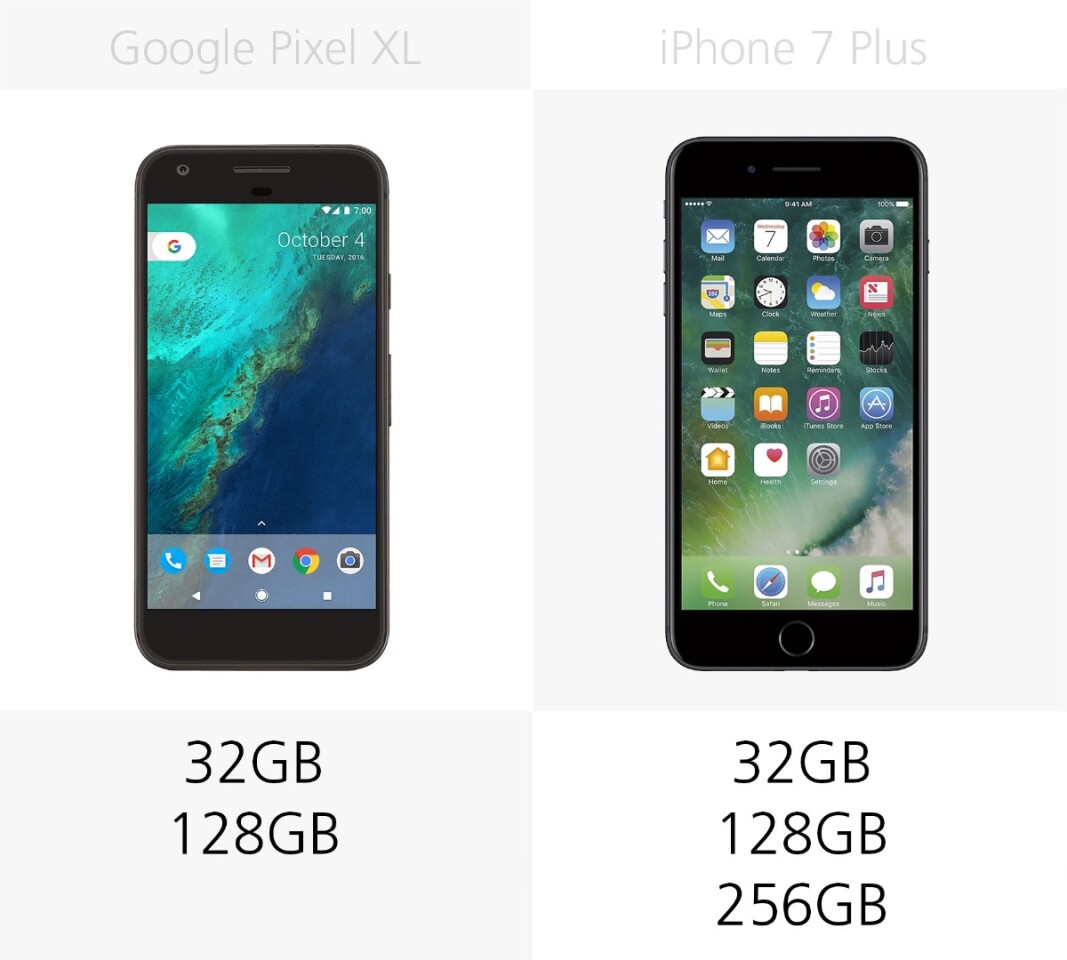
Both phones are available with 32 or 128 gigabytes of storage, which should be ample for most users. Apple also offers a capacious 256-gigabyte option for power users.
microSD

If you were crossing your fingers for an iPhone alternative with external storage, you'll need to look elsewhere. The iPhone 7 Plus is not expandable, which is no surprise, but many had different hopes for Google's first phablet.
VR-ready

If you want to join the masses already using mobile virtuality reality (VR) headsets, steer clear of the iPhone. The Pixel XL, on the other hand, is compatible with Google's recently launched and fairly affordable Daydream View.
Headphone jack

Even though Apple has been liberal with the axe, headphone jacks have not gone the way of the dinosaur just yet. Pixel XL has a dedicated jack for your ear candy.
Fingerprint sensor
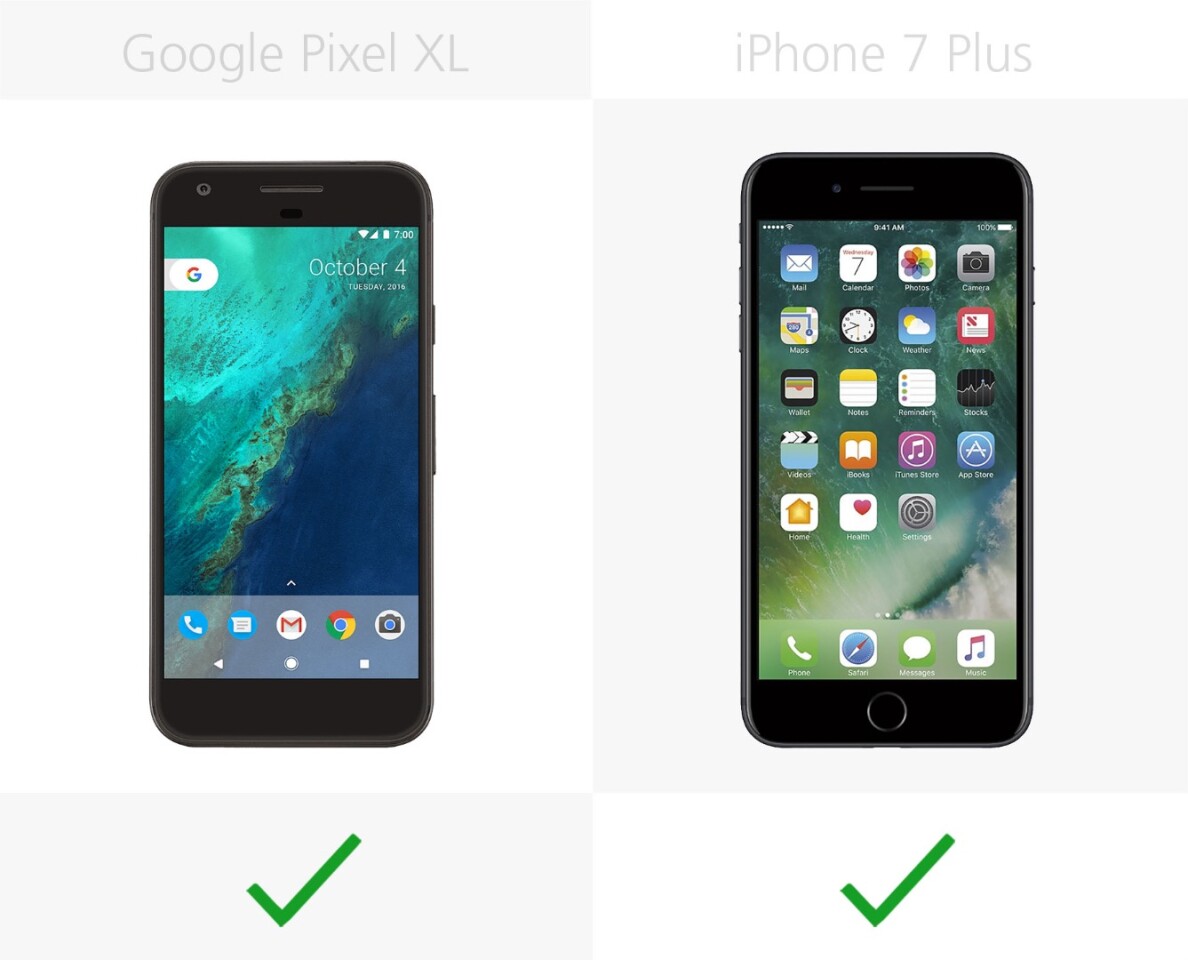
The fingerprint sensor is becoming ubiquitous: We can't think of one mid-range or high-end phone released this year that doesn't have a fingerprint sensor. The Pixel's sensor is on the back, and the iPhone's sensor is built into the home button on the front.
Home button
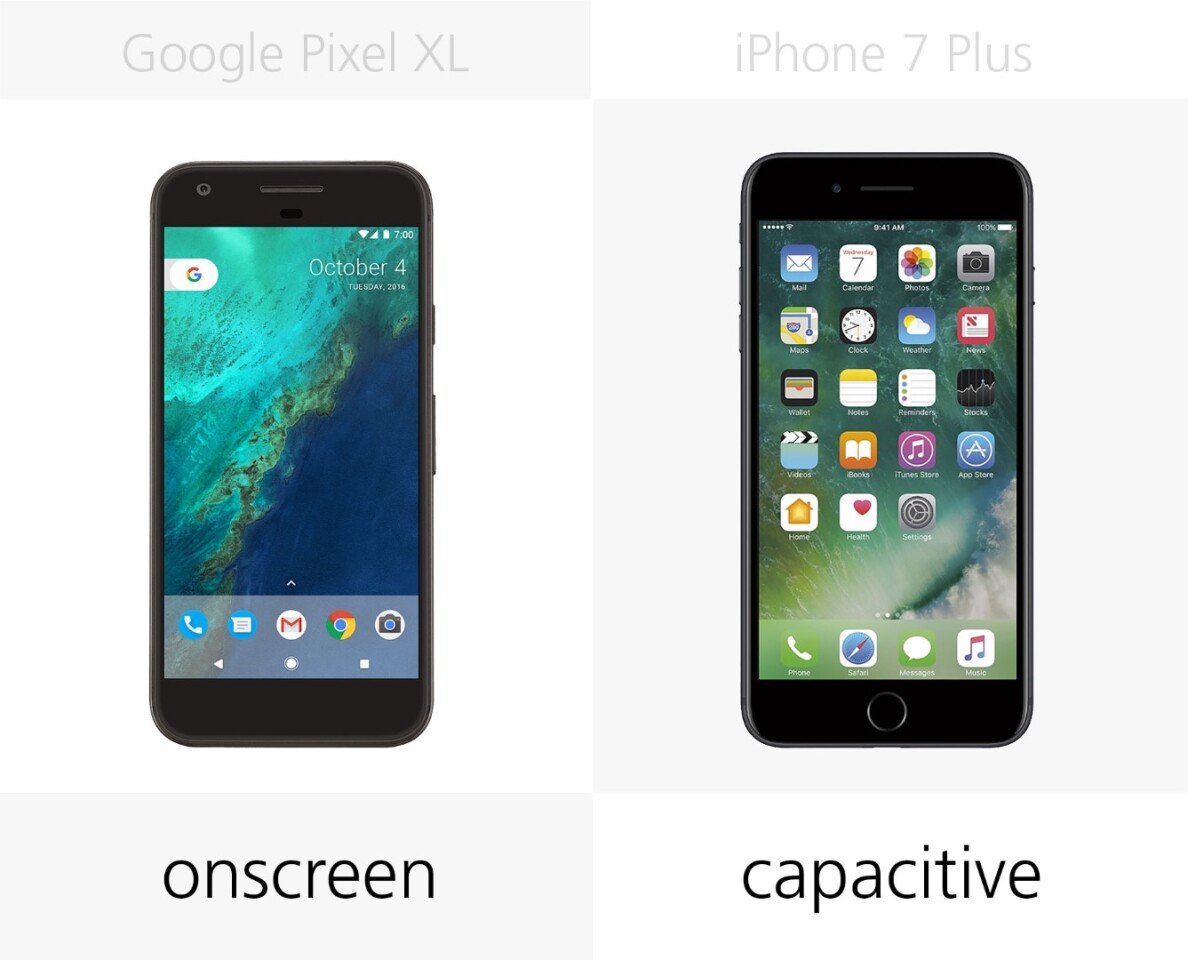
Like most Android phones, Pixel XL has an onscreen home button with a back button on the left and a recent apps button on the right. The iPhone 7 Plus has a uniquely Apple solid-state home button with haptic feedback for your pressing pleasure. It's positioned below the display, so it doesn't take up any onscreen real estate.
Mobile payments
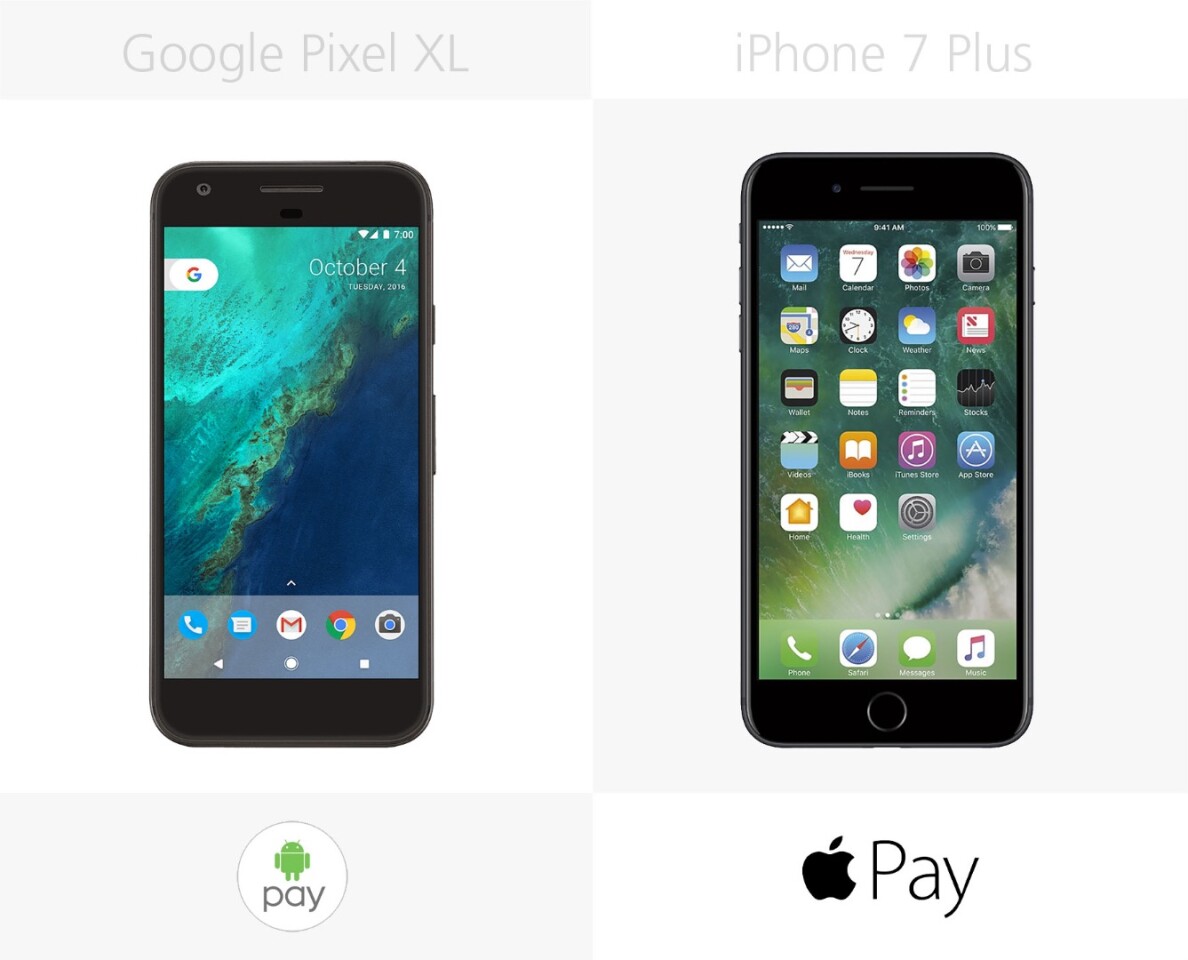
No surprises here – Pixel XL's equipped with Android Pay, and the iPhone 7 Plus has Apple Pay. Merchants that are mobile payment-ready can often accept either, since they have similar requirements.
Virtual assistant
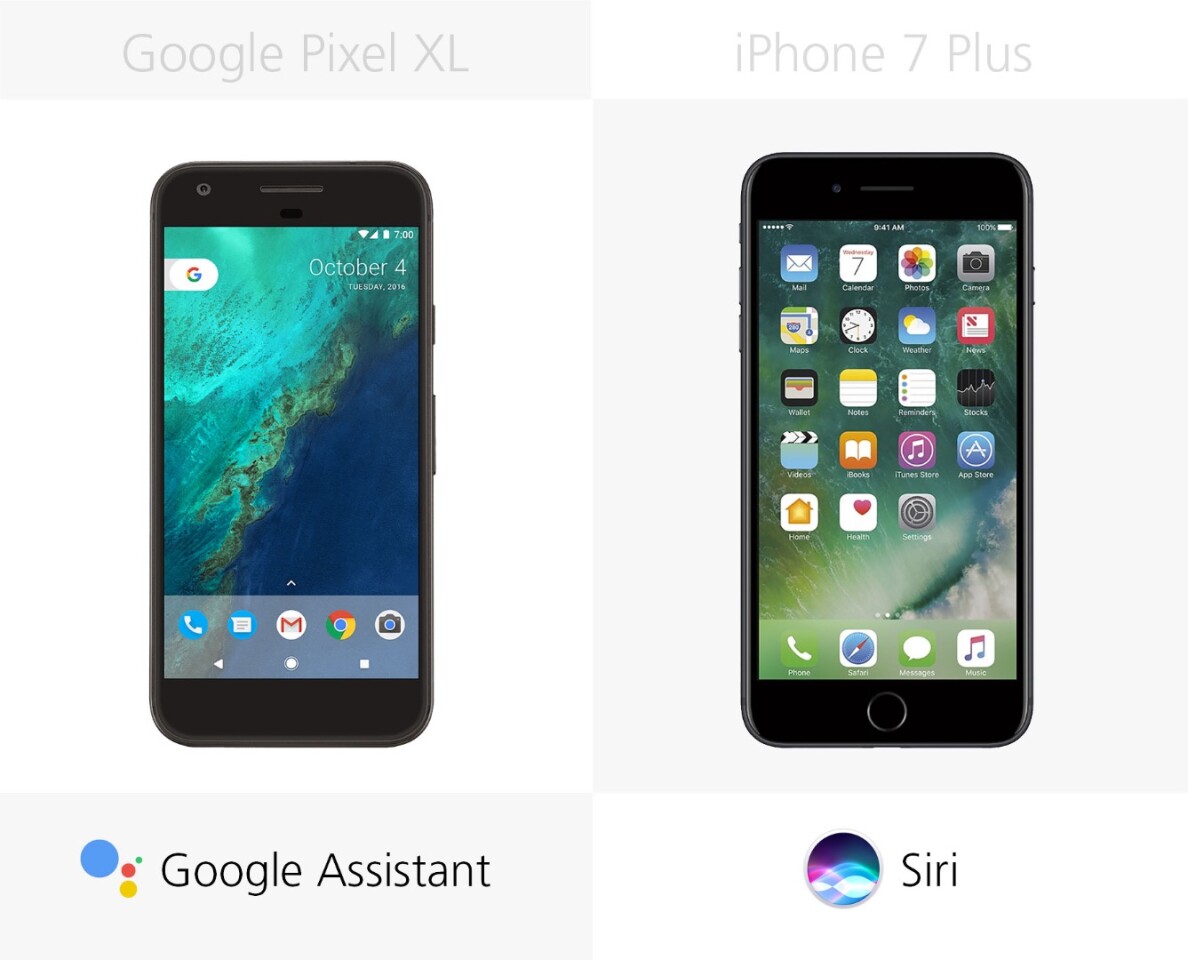
The Pixel and Pixel XL are the first phones with Google Assistant built in. Google Assistant is being billed as a more intelligent and powerful alternative to Siri, so we will be sure to test its full capabilities in our upcoming Pixel review.
Operating system
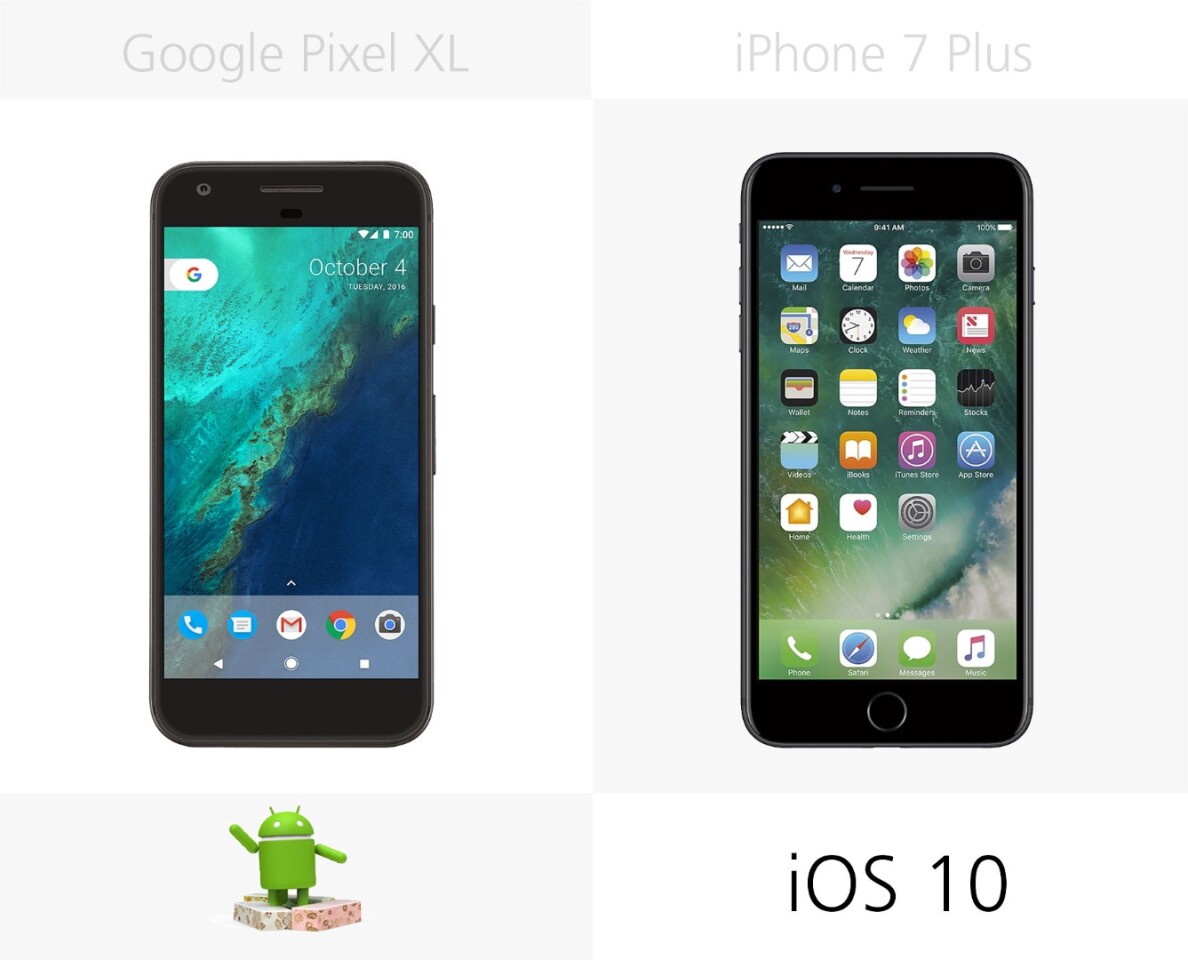
The iPhone 7 Plus launched with iOS 10, but since Apple pushes software updates onto all iPhones, you can count on that operating system being continuously updated until the phone goes kaput.
Not all Android phones get the latest and greatest software updates, but the Pixel will be at the front of the line. As a Google-branded phone, it launches with the brand new Android 7.1 Nougat and will receive all updates for at least two years and security updates for at least three years.
Release
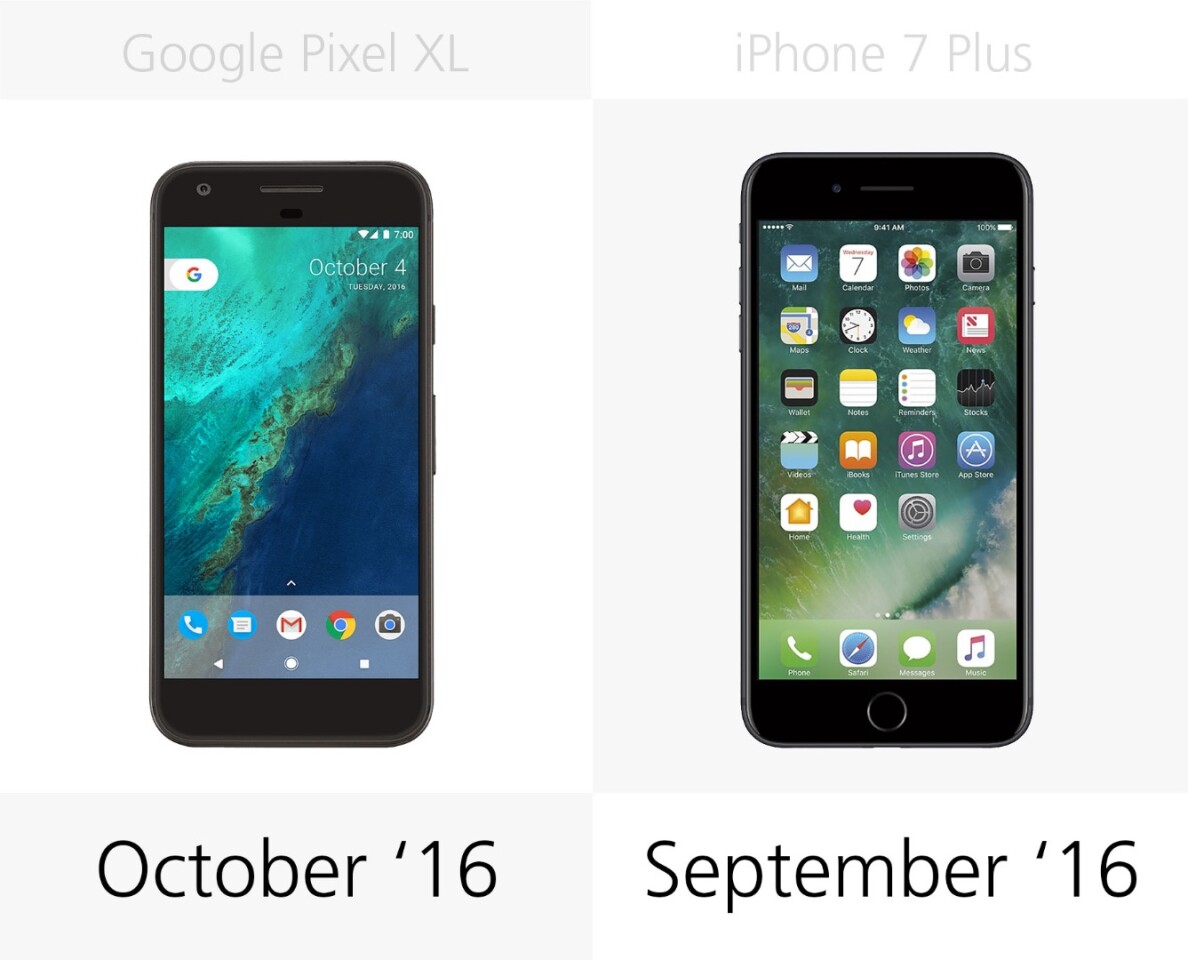
Apple released the iPhone 7 and 7 Plus just weeks before Google launched the Pixel and Pixel XL.
Starting price (full retail)
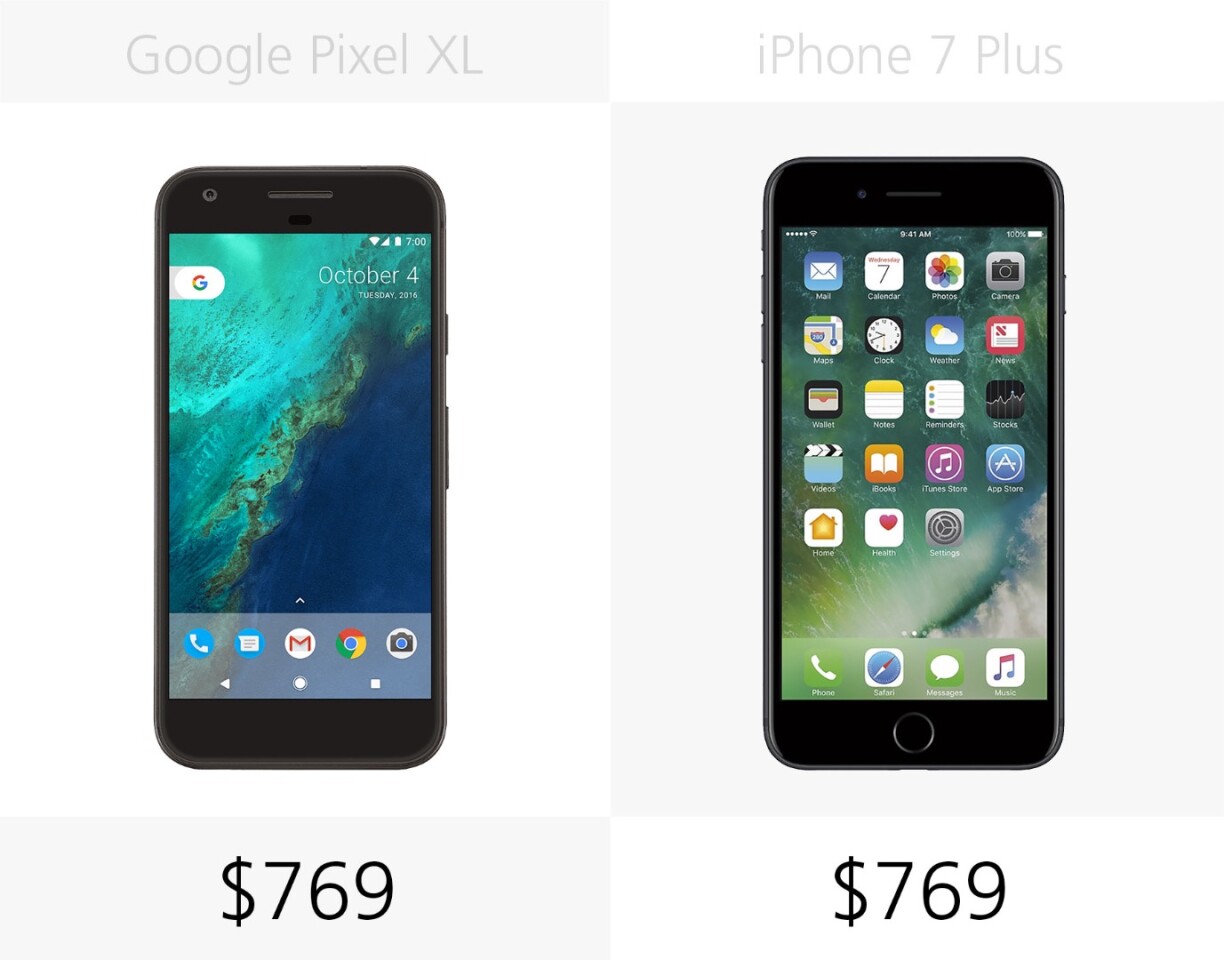
Like their little brothers the Pixel and iPhone 7, Pixel XL and iPhone 7 Plus have the same price points, which suggests that Google intends these phones to be direct competitors. The 32 GB models are $769 and the 128 GB models are $869, while the 256 GB iPhone is $969.
While the base-level flagships seem neck-and-neck, the differences between these phablets are little more distinct. iPhone 7 Plus has an advantage in terms of camera capability and water resistance, but the Pixel XL is outfitted for perks like VR, proper headphones and fast charging. Read up more with our full reviews of the Pixel XL and iPhone 7 Plus.


